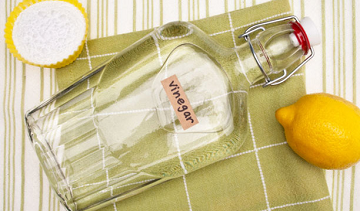
While vinegar is great when added to some foods, it is also great as a natural, non-toxic cleaning product for the home. Since most homes keep a bottle of vinegar in their store cupboards, it’s right there at hand when we need to clean, and if it isn’t in your cupboard already, then you can easily and cheaply buy a bottle at any grocery store.
However, while vinegar is fantastic for cleaning a whole bunch of things around the home, there are some products and materials that it can’t safely be used on; here are a few tips on when you should and shouldn’t use vinegar to clean something:
What NOT to clean with vinegar:
The acid levels in vinegar mean that it can easily cut through grease and grime, but its’ acidity can also be harmful to some surfaces. Here is a list of surfaces that vinegar shouldn’t be used on, along with what you could use instead:
- Soapstone, marble and granite counters – acids should never be applied to these surfaces as it can cause them to lose their shine and develop a pitting effect. Instead of vinegar to clean them, you could use a shop bought granite cleaning solution
- Kitchen knives – using acid on your best kitchen knives will not do them any favours, instead of vinegar, simply use a good quality dish soap and water.
- Spilled egg – this can be a nightmare to clean but using vinegar will turn it into an even bigger sticky mess as the egg proteins coagulate to form a sticky, glue-like substance. Better to use a good quality dish soap and a warm, soapy cloth.
- Clothes iron – if vinegar gets into the inner workings of a clothes iron, it can be very damaging, so it really is best to use a good old soapy dishcloth instead.
- Furniture made of solid wood – in some cases, a polishing solution can be made that’s comprised of vinegar and olive oil, but for cleaning wood, vinegar is not recommended as it can damage certain kinds of finishes to the surface of the wood. Instead, use a natural furniture polish.
In addition to some items and surfaces that you shouldn’t use vinegar on, there are some that it can be used on, but only sparingly:
- Hardwood floors
- Stone floors
- Grout
Since these are all porous surfaces, they are susceptible to damage by acidic cleaning solutions such as vinegar. That said, provided the vinegar is heavily diluted, its use may still be of benefit, so just use your judgement when cleaning these surfaces and always test it out on a small area first.
What can be safely cleaned with vinegar?
As stated at the top of this post, there are a wide range of surfaces and products that vinegar can be used safely on, and here are just a few of them:
- Washing machines
- Dishwashers
- Carpets
- Refrigerators
- Shower heads
- Soap scum
- Reusable shopping bags
- Denim and suede
- Clogged drains
- Windows and mirrors
- Humidifier
- Anything sticky
For a safe and environmentally friendly solution to a whole host of cleaning problems in your home, reach out for that bottle of vinegar now!
